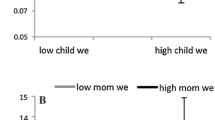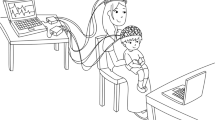Abstract
Research has found that maternal fatigue can negatively impact mother–child interactional patterns. In this study, it was hypothesized that a mother with more fatigue would have fewer positive verbal strategies and more negative verbal strategies while guiding her child’s behavior. The participants were 34 mother-toddler dyads. The Patience Task, a task where mothers were told that their toddlers could not touch a desirable toy for 8 min, was used to observe how mothers verbally guided their toddlers’ behavior. Using a coding scheme developed by Koenig et al. (Child Dev 71:1018–1032, 2000), the frequency of positive verbal control strategies included requesting the child perform or stop performing a behavior (polite do); hinting to the child that they should stop a behavior (hint do); praising the child in order for a behavior to continue (positive evaluation); requesting the child behave a certain way in exchange for something (bargaining); and sympathizing with the child to show an understanding of the child’s feelings (empathy) was coded. The frequency of negative verbal control strategies included chastising the child for not following directions (negative evaluation) was also coded. Higher levels of maternal fatigue were associated with mothers using fewer polite dos (r = −.32, p = .07), hint dos (r = −.37, p = .04), and positive evaluations (r = −.31, p = .08) during the Patience Task. Sleep deprivation was associated with polite dos (r = −.52, p = .00), hint dos (r = −.46, p = .00), and bargaining (r = −.39, p = .03). Using hierarchical linear regression, fatigue and child temperament covariates were associated with polite dos (F (2,29) = 3.23, p = .05) and positive evaluation (F (2,28) = 3.53, p = .04). Sleep and child temperament covariates were also associated with polite dos (F (2,30) = 7.51, p = .00) and hint dos (F (2,28) = 6.61, p = .00). This study contributes to our understanding of maternal fatigue and child factors that influence maternal verbal control strategies used to get toddlers to follow maternal directions.
Similar content being viewed by others
References
Aaronson, L. S., Teel, C. S., Cassmeyer, V., Neuberger, G. B., Pallikkathayil, L., Pierce, J., et al. (1999). Defining and measuring fatigue. Journal of Nursing Scholarship, 31, 45–50.
Bates, J. E., Schermerhorn, A. C., & Petersen, I. T. (2012). Temperament and parenting in developmental perspective. In M. Zentner & R. L. Shiner (Eds.), Handbook of temperament (pp. 425–441). New York, NY: Guilford.
Bell, B. G., & Belsky, J. (2008). Parents, parenting, and children’s sleep problems: Exploring reciprocal effects. British Journal of Developmental Psychology, 26, 579–593.
Benoit, D., Aeanah, C. H., Boucher, C., & Minde, K. K. (1992). Sleep disorders in early childhood: Associations with insecure maternal attachment. Journal of the American Academy of Child and Adolescent Psychiatry, 31, 86–93.
Cole, P. M., Armstrong, L. M., & Pemberton, C. K. (2010). The role of language in the development of emotion regulation. In S. D. Calkins & M. A. Bell (Eds.), Child development at the intersection of emotion and cognition (pp. 59–77). Washington, DC: American Psychological Association.
Corwin, E. J., & Arbour, M. (2007). Postpartum fatigue and evidence-based interventions. MCN, The American Journal of Maternal Child Nursing, 32, 215–220.
Crockenberg, S., & Litman, C. (1990). Autonomy as competence in 2-year-olds: Maternal correlates of child defiance, compliance, and self-assertion. Developmental Psychology, 26, 961–971.
Dix, T., Gershoff, E. T., Meunier, L. N., & Miller, P. C. (2004). The affective structure of supportive parenting: Depressive symptoms, immediate emotions, and child-oriented motivation. Developmental Psychology, 40, 1212–1227.
Edwards, C., & Liu, W. (2002). Parenting toddlers. In M. H. Bornstein (Ed.), Handbook of parenting: Vol. 1: Children and parenting (2nd ed.) (pp. 45–71). Mahwah, NJ US: Lawrence Erlbaum Associates Publishers.
Erikson, E. (1963). Childhood and society. New York: W.W. Norton and Company.
Fisk, J. D., Ritvo, P. G., Ross, L., Hasse, D. A., Marrie, T. J., & Schlech, W. R. (1994). Measuring the functional impact of fatigue: Initial validation of the fatigue impact scale. Clinical Infectious Disease, 18(Suppl. 1), 79–83.
Fischer, J. S., LaRocca, N. G., Miller, D. M., Ritvo, P. G., Andrews, H., & Paty, D. (1999). Recent developments in the assessment of quality of life in multiple sclerosis (MS). Multiple Sclerosis, 5, 251–259.
Giallo, R., Rose, N., & Vittorino, R. (2011). Fatigue, wellbeing and parenting in mothers of infants and toddlers with sleep problems. Journal of Reproductive and Infant Psychology, 29, 236–249.
Goodman, S. H., & Gotlib, I. H. (1999). Risk for psychopathology in the children of depressed mothers: A developmental model for understanding mechanisms of transmission. Psychological Review, 106, 458–490.
Grolnick, W. S., Durowski, C. O., McMenamy, J. M., Rivkin, I., & Bridges, L. J. (1998). Mothers’ strategies for regulating their toddlers’ distress. Infant Behavior and Development, 21, 437–450.
Hays, R. D., Martin, S. A., Sesti, A. M., & Spritzer, K. L. (2005). Psychometric properties of the medical outcomes sleep study measure. Sleep Medicine, 6, 41–44.
Hwa-Froelich, D. A., Loveland Cook, C. A., & Flick, L. H. (2008). Maternal sensitivity and communication styles: Mothers with depression. Journal of Early Intervention, 31, 45–66.
Joussemet, M., Landry, R., & Koestner, R. (2008). A self-determination theory perspective on parenting. Canadian Psychology, 49, 194–200.
Kiff, C. J., Lengua, L. J., & Zalewski, M. (2011). Nature and nurturing: Parenting in the context of child temperament. Clinical Child and Family Psychology Review, 14, 251–301.
Kochanska, G. (2002). Mutually responsive orientation between mothers and their young children: A context for the early development of conscience. Currently Directions in Psychological Science, 11, 191–195.
Kochanska, G., & Aksan, N. (1995). Mother-child mutually positive affect, the quality of child compliance to requests and prohibitions, and maternal control as correlates of early internalization. Child Development, 66, 236–254.
Koenig, A. L., Cicchetti, D., & Rogosch, F. A. (2000). Child compliance/noncompliance and maternal contributors to internalization in maltreating and non-maltreating dyads. Child Development, 71, 1018–1032.
LeCuyer, E., & Houck, G. M. (2006). Maternal limit-setting in toddlerhood: Socialization strategies for the development of self-regulation. Infant Mental Health Journal, 27, 344–370.
LeCuyer-Maus, E. A. (2000). Maternal sensitivity and responsiveness, limit-setting style, and relationship history in the transition to toddlerhood. Issues in Comprehensive Pediatric Nursing, 23, 117–139.
LeCuyer-Maus, E. A., & Houck, G. M. (2002). Maternal characteristics and maternal limit-setting styles. Public Health Nursing, 19, 336–344.
Lovejoy, M., Gracyk, C., O”Hare, P. A., & George, E. N. (2000). Maternal depression and parenting behavior: A meta-analytic review. Clinical Psychology Review, 20, 561–592.
Martin, S. E., Clements, M. L., & Crnic, K. A. (2002). Maternal emotions during mother-toddler interaction: Parenting in affective context. Parenting: Science and Practice, 2, 105–126.
Matte-Gagné, C., & Bernier, A. (2011). Prospective relations between maternal autonomy support and child executive functioning: Investigating the mediating role of child language ability. Journal of Experimental Child Psychology, 110, 611–625.
Meltzer, L. J., & Mindell, J. A. (2007). Relationships between child sleep disturbances and maternal sleep, mood, and parenting stress: A pilot study. Journal of Family Psychology, 21, 67–73.
Middleton, M., Scott, S. L., & Renk, K. (2009). Parental depression, parenting behaviours, and behaviour problems in young children. Infant and Child Development, 18, 323–336.
Mills, R. J., & Young, C. A. (2008). A medical definition of fatigue in multiple sclerosis. QJM: An International Journal of Medicine, 101, 49–60.
Mindell, J. A., Meltzer, L. J., Carskadon, M. A., & Chervin, R. D. (2009). Developmental aspects of sleep hygiene: Findings from the 2004 national sleep foundation sleep in America poll. Sleep Medicine, 10, 771–779.
Nicholson, J. S., Deboeck, P. R., Farris, J. R., Boker, S. M., & Borkowski, J. G. (2011). Maternal depressive symptomatology and child behavior: Transactional relationship with simultaneous bidirectional coupling. Developmental Psychology, 47, 1312–1323.
Panscsofar, N., & Vernon-Feagans, L. (2006). Mother and father language input to young children: Contributions to later language development. Journal of Applied Developmental Psychology, 27, 571–587.
Paulson, J. F., Keefe, H. A., & Leiferman, J. A. (2009). Early parental depression and child language development. Journal of Child Psychology and Psychiatry, 50, 254–262.
Rowe, D. C., & Plomin, R. (1977). Temperament in early childhood. Journal of Personality Assessment, 41, 150–156.
Runquist, J. J. (2007). A depressive symptoms responsiveness model for differentiating fatigue from depression in the postpartum period. Archives of Women’s Mental Health, 10, 267–275.
Sadeh, A., Lavie, P., & Scher, A. (1994). Sleep and temperament: Maternal perceptions of temperament of sleep-disturbed toddlers. Early Education and Development, 5, 311–322.
Sohr-Preston, S. L., & Scaramella, L. V. (2006). Implications of timing of maternal depressive symptoms for early cognitive and language development. Clinical Child and Family Psychology Review, 9, 65–83.
Spritzer, K. L., & Hays, R. D. (2003). MOS sleep scale: A manual for use and scoring, Version 1.0. Santa Monica, CA: RAND Corporation.
Stansbury, K., & Zimmermann, L. K. (1999). Relations among child language skills, maternal socialization of emotion regulation, and child behavior problems. Child Psychiatry and Human Developoment, 30, 121–140.
Stein, A., Malmberg, L. E., Sylva, K., Barnes, J., Leach, P., & the FCCC team. (2007). The influence of maternal depression, caregiving, and socioeconomic status in the post-natal year on children’s language development. Child: Care, Health and Development, 34, 603–612.
Tabachnick, B. G., & Fidell, L. S. (1996). Using multivariate statistics (3rd ed.). New York, NY: Harper Collings College Publisher.
Tellez, N., Rio, J., Tintore, M., Nos, C., Galan, I., & Montalban, X. (2005). Does the modified fatigue impact scale offer a more comprehensive assessment of fatigue in MS? Multiple Sclerosis, 11, 198–202.
Troy, N. W. (1999). A comparison of fatigue and energy levels at 6 weeks and 14–19 months postpartum. Clinical Nursing Research, 8, 135–152.
Vallotton, C., & Ayoub, C. (2011). Use your words: The role of language in the development of toddler self-regulation. Early Childhood Research Quarterly, 26, 169–181.
Van der Mark, I. L., Bakermans-Kranenburg, M. J., & van Ijzendoorn, M. H. (2002). The role of parenting, attachment, and temperamental fearfulness in the prediction of compliance in toddler girls. British Journal of Developmental Psychology, 20, 361–378.
Vygotsky, L. S. (1986). Thought and language (A. Kozulin, Trans.) Cambridge, MA: The MIT Press. (Original work published 1934).
White, C. P., White, M. B., & Fox, M. A. (2009). Maternal fatigue and its relationship to the caregiving environment. Families, Systems, and Health, 27, 325–345.
Winsler, A., Ducenne, L., & Koury, A. (2011). Singing one’s way to self-regulation: The role of early music and movement curricula and private speech. Early Education and Development, 22, 274–304.
Author information
Authors and Affiliations
Corresponding author
Rights and permissions
About this article
Cite this article
White, C.P., Bradley, S.L., Neverve, L. et al. Does Maternal Fatigue Influence Maternal Verbal Control in a Stressful Parenting Task with Toddlers?. J Child Fam Stud 24, 351–362 (2015). https://doi.org/10.1007/s10826-013-9843-x
Published:
Issue Date:
DOI: https://doi.org/10.1007/s10826-013-9843-x




